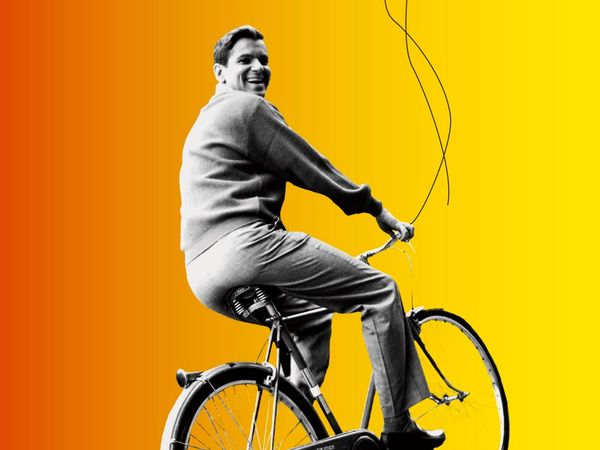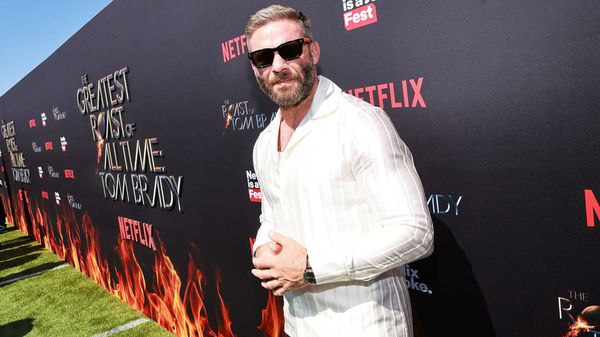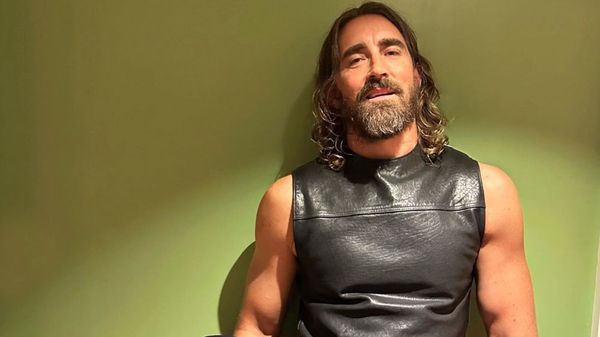
October 26, 2023
Review: In 'Fellow Travelers,' Mismatched Lovers Endure Across Decades
Kilian Melloy READ TIME: 5 MIN.
Showtime's eight-episode miniseries "Fellow Travelers" – adapted by "Philadelphia" screenwriter Ron Nyswaner from Thomas Mallon's novel – follows two men in love from one era of existential threat to another: From the days of the Lavender Scare to the peak of the AIDS crisis. The sex is hot; the stakes are high; the lives caught up between political persecution and uncontrollable passion are deeply marked.
The Lavender Scare was an extension of Sen. Joseph McCarthy's Red Scare, a fear-mongering power ploy in which the senator, with a young lawyer named Roy Cohn at his side, whipped up a frenzy around claims that the Hollywood, the military, and the U.S. government had been infiltrated by Communists and Russian spies. McCarthy's crusade led to the creation of a government committee to root out these hypothetical spies and saboteurs – "fellow travelers" – by subjecting any and all who might be accused to political inquisition. The Lavender Scare was but one facet of this larger mayhem, and it focused on the notion that along with Communists, LGBTQ+ people had found their way to government jobs, where they posed security risks since they could be found out and blackmailed by enemies.
It's into this vortex of paranoia and accusations that Mallon's novel – and now Nyswaner's adaptation – drops two fictional characters, both gay. Hawkins "Hawk" Fuller (Matt Bomer) is a war hero working in the State Department. Brilliant, apolitical, and ruthless, he excels at making deals and maneuvering himself for career advantage. When it suits him, he extends his manipulations to protecting and shepherding other closeted queer civil servants.
The young and idealistic Tim Laughlin (Jonathan Bailey) falls into Hawk's orbit, and his bed. Torn between his sexuality and his Catholic faith, Tim is fervently committed to McCarthy's anti-communist cause. When Tim and Hawk become involved, Hawk arranges for Tim to work in McCarthy's (Chris Bauer) office – a career boost for the politically ambitious young man, but also a strategic move for Hawk, who uses Tim as a means to keep informed about McCarthy's doings... not so much for the good of gay Americans, as for the benefit of his surrogate father, Senator Smith (Linus Roache), a McCarthy opponent.
But while Hawk's affection for Tim is deep and genuine – he calls Tim "Skippy," and ushers him into situations where dominance and submission are core to their sex life – it may also be provisional; before long, we realize that Hawk is willing to sacrifice anyone to protect those he's gathered around him, and if push comes to shove he will sacrifice his closest confidants to protect himself. Just how far will Hawk go to nourish his relationship with Tim?
The long arc of the series' emotional tension is powered by sizzling sex scenes between Hawk and Tim, some of it rough and most of it involving a degree of domination and submission ("Whose boy are you?" "I'm your boy!").
That sexual intensity wanes as the characters age and as their lives pull them in different directions – but it's almost entirely missing from the other relationships depicted in the series, which is rounded out by a number of subplots and parallel narratives. Far more present is a sense of threat and shame. Even as Hawk and Tim embark on their decades-long affair, with the idealistic Tim learning the ropes from the cynical Hawk, Roy Cohn (Will Brill) is leading his own double life: He's not only a gay man leading the attack against others of his own kind, he's hopelessly in love with a young man named David Schine (Matt Visser), a handsome and entitled scion of a wealthy and influential family. Unfortunately for Cohn, Schine is also a straight man who's perfectly willing to use Cohn's devotion to get ahead. Meantime, Marcus (Jellani Alladin), a Black journalist, weighs his own concessions to ambition when he becomes enamored with Frankie (Noah J. Ricketts), a fearlessly open drag performer.
As in many of Mallon's novels, the characters are a mix of real and fictional personae. McCarthy, Cohn, and Schine were real figures from history, and Cohn's infatuation with Schine led to his demanding special privileges for the young man when he was drafted, which raised some eyebrows, led to Cohn's resignation from McCarthy's office, and, it's thought, set the stage for McCarthy's eventual downfall. (The real Roy Cohn was also a mentor to a young Donald Trump; many of the former president's pugilistic tendencies come straight from Cohn's playbook.)
But while "Fellow Travelers" imagines ways to insert Hawk and Tim into this historical context, the story isn't confined to the McCarthy era. Hawk, always mindful of appearances, marries Sen. Smith's daughter Lucy (Allison Williams) and meticulously crafts his career trajectory, while Tim – his illusions shattered – charts an erratic course through life. The series jumps back and forth from 1986 (when the two men are reunited one final time against the backdrop of AIDS, governmental indifference to the crisis, and community activism) and various points in the 1950s, '60s, and '70s, as their paths entwine and separate.
We hear that Tim never settled down with a long-term partner; his love and devotion to Hawk are too strong. As for Hawk, his emotional isolation, his habit of compartmentalizing his life, and his willingness to live a lie all contribute to familial dysfunction, with tragic results. In today's world Hawk and Tim could be a married couple, living openly and happily; that simply wasn't an option in the middle of the 20th century, particularly after 1953, when President Eisenhower signed Executive Order 10450, which cleared the way for a program of surveillance, investigation, and expulsion of LGBTQ+ government employees.
With today's homophobic forces once again systematically churning out lurid falsehoods to frighted and alienate mainstream society from queer Americans, the themes of the series (and its examination of the personal, familial, and social costs of building power on such lies) couldn't be more timely. The sense of fear, and of rage, inspired by this fiction is real. But the series works well as a period piece, too; fans of shows like "Mad Men" will appreciate the production's attention to detail and design.
This is a series with moments of charm and glimpses of happiness, though much of it is cast in the vein of a political thriller crossed with a tragic love story. The eight episodes vary in tone and mood, but they are reliably absorbing; Hawk may not be an entirely sympathetic character, and Tim may be too much of a wet rag to gain the audience's unquestioning devotion, but Lucy's anguish at being dragged into Hawk's labyrinth of lies – and, in later episodes, the struggles of Hawk's son, Jackson (Watson Clements) – will tug at whatever heartstrings the two central characters' impossible love affair don't.
"Fellow Travelers" premieres on Oct. 27 on Paramount+ with Showtime and Oct. 29 on Showtime.
Kilian Melloy serves as EDGE Media Network's Associate Arts Editor and Staff Contributor. His professional memberships include the National Lesbian & Gay Journalists Association, the Boston Online Film Critics Association, The Gay and Lesbian Entertainment Critics Association, and the Boston Theater Critics Association's Elliot Norton Awards Committee.







